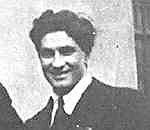
Thomas Whelan, from Clifden, Galway, was charged with the murder of Captain G. T. Baggally. Whelan was "identified" as one of the gunmen and sent to Kilmainham. The high-profile nationalist and later final Governor General of the Free State, Tim Healy, refused to defend them. He left home at 18 to work at Broadstone train depot in Dublin and while there joined A Company, 3rd Battalion, Dublin Brigade.

Thomas Whelan
1898 Oct 5 Born
O'Malley described Whelan as "... smooth-faced, quiet and brown eyed with wavy hair; he smiled quietly and steadily. His voice was soft and when he laughed with the others one knew that the fibre was not as hard and that there was a shade of wistfulness about him." It emerged later that while under torture, a prisoner named Barnett had made a false statement which, he feared, had incriminated Whelan. When Barnett eventually heard of Whelan's execution, he became hopelessly insane and was transferred to Richmond Asylum.
He was arrested on 23 November 1920 and, on 1 February 1921, he was charged with the shooting of Captain Baggallay, on Bloody Sunday (1920). He protested his innocence of the charges. As in the case of Patrick Moran there was eye witness evidence that Whelan had been at Mass at the time the shooting took place. Nonetheless he was found guilty of murder and sentenced to death.
1921 Mar 14. He was one of six men executed in Mountjoy Prison, Dublin. He was 22 years old at the time of his death. He was hanged at 6am along with Patrick Moran, the first of six men to be executed that day. A crowd estimated at 40,000 gathered outside the prison to pray as the executions took place.